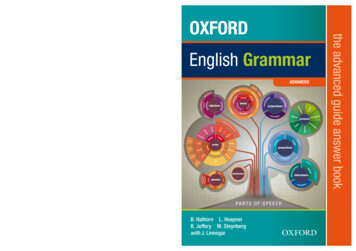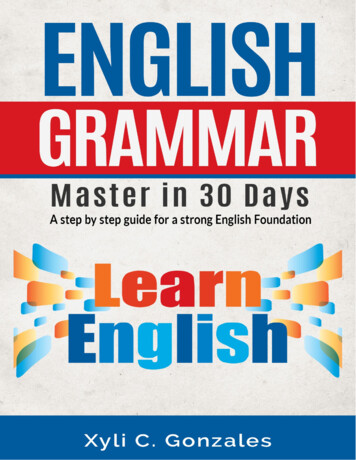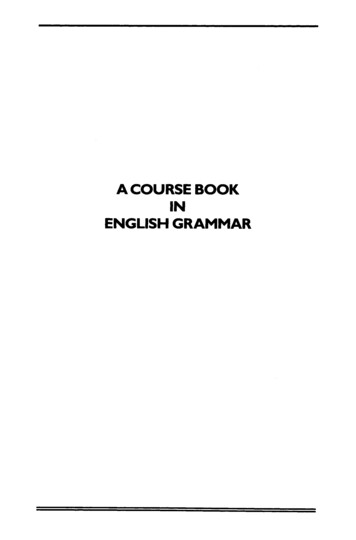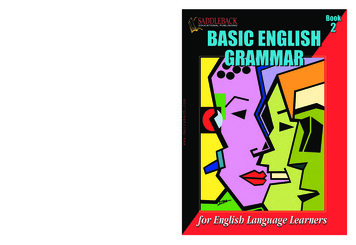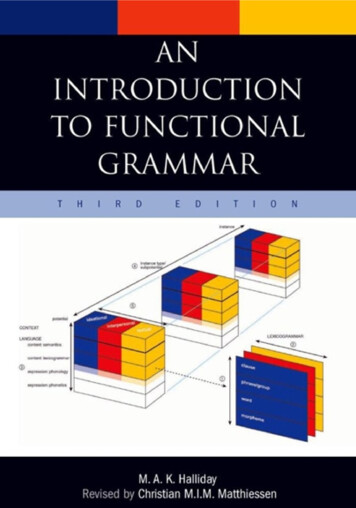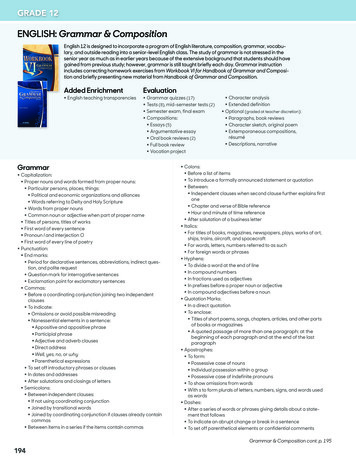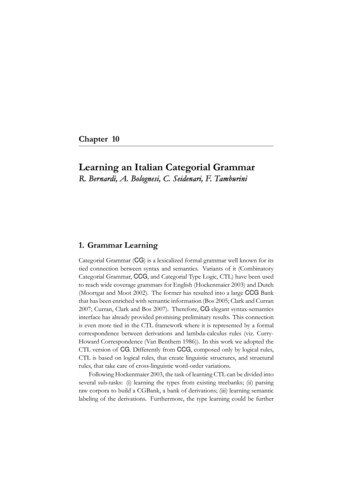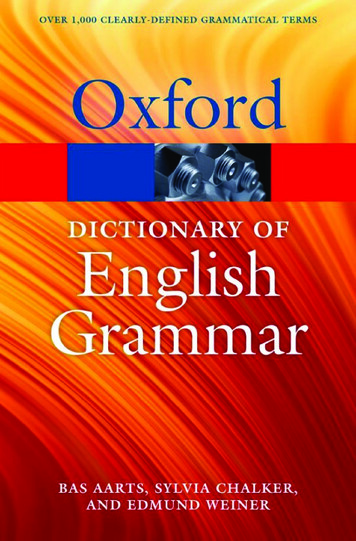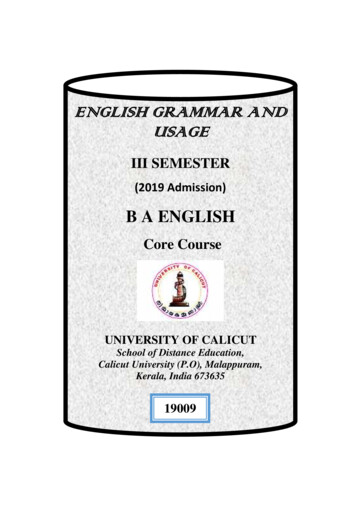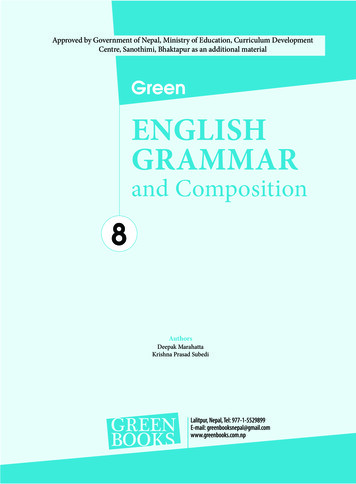
Transcription
Approved by Government of Nepal, Ministry of Education, Curriculum DevelopmentCentre, Sanothimi, Bhaktapur as an additional materialGreenENGLISHGRAMMARand Composition8AuthorsDeepak MarahattaKrishna Prasad SubediGREEN English Grammar and Composition- 81
GreenENGLISHGRAMMARand Composition8Publisher: Green BooksCopyright: Authors (2075 BS)All rights reserved. No part of this book maybe reproduced, stored in a retrievalsystem, or transmitted in any form or by any means without prior information inwriting from the publisher or the author.EditionFirstRe-printRe-printRe-print: B.S. 2075 (2018 AD): B.S. 2076 (2019 AD): B.S. 2077 (2020 AD): B.S. 2078 (2021 AD)LayoutThe Focus Computerfocus.dipendra@gmail.comPrinted in Nepal
PrefaceGREEN ENGLISH GRAMMAR AND COMPOSITION is a series of ten books designedprimarily for classroom use. It embraces recent approaches in teaching and learningEnglish grammar through a contextualized approach. Every grammar concept isintroduced through appropriate contexts and the learner is gradually taken through theprocess of inferring the rule from language use. These contexts are always related to theage and interests of the learners. The grammar rules are presented in a language thatis easy to understand and internalize. They are further reinforced through a variety oflearner-centred tasks and activities, many of which take place in their real life situations.The grammatical concepts have been treated in a very simple way in the beginner serieswith progression to more details in later series.The main purpose of GREEN GRAMMAR is to develop in young learners anunderstanding and control of the essential blocks of English grammar and to providethem with a solid platform for further development of language. The focus of grammaris both fluency and accuracy. The emphasis across the series is on meaning andappropriate use of forms in different situations.GREEN GRAMMAR is divided into individual units or lessons each of which has asingle focus. The units follow a tried and tested ‘presentation-explanation-practice’format. All the units begin with a text in context (e.g. a rhyme, a dialogue, a chart, a story,a letter, or a picture-based description) that demonstrates how the grammatical formsare used in real life situations. The presentation activities have been carefully gradedto stimulate learner’s interest while at the same time focusing on the grammatical rulesinductively. The explanation which follows draws attention to the relevant parts of thetext and examples. Effort has been made to include a variety of exercises to reinforcelearning goals and avoid boredom. All the units consist of writing activities related tothe grammatical concepts introduced in each level.The activities included under Speaking Fun provide exposure to a variety of languagefunctions. All the units have a comprehension section which invites students toconsolidate their understanding of grammar and reading skill. Each book ends withSmart Writing Activities, a writing section that aims at developing learners’ writingskills in an effortless and creative way. These activities are related to meaningful themesthat the learner is likely to find at each stage of learning.Finally, with its profusion of lively and colourful illustrations, GREEN GRAMMARdemonstrates that the learning of grammar, even at primary level, should not bedifficult or boring. On the contrary, when the learning materials are relevant to the ageand interests of the young learner, grammar lessons can be not only interesting but alsofun.Authors2018
Content1.Sentence . . . . . . . . . . . . . . . . . . . . . . . . . . . . . . . . . . . . . . . . . . 52.Nouns . . . . . . . . . . . . . . . . . . . . . . . . . . . . . . . . . . . . . . . . . . . 363.Determiners . . . . . . . . . . . . . . . . . . . . . . . . . . . . . . . . . . . . . . 464.Pronouns . . . . . . . . . . . . . . . . . . . . . . . . . . . . . . . . . . . . . . . . 705.Question Tag . . . . . . . . . . . . . . . . . . . . . . . . . . . . . . . . . . . . . 846.Subject Verb Agreement . . . . . . . . . . . . . . . . . . . . . . . . . . . 977.Tense . . . . . . . . . . . . . . . . . . . . . . . . . . . . . . . . . . . . . . . . . . . 1108.Conditional Sentences . . . . . . . . . . . . . . . . . . . . . . . . . . . . 1409.Prepositions . . . . . . . . . . . . . . . . . . . . . . . . . . . . . . . . . . . . . 15010. Active and Passive Voice . . . . . . . . . . . . . . . . . . . . . . . . . . 17311. Conjunctions . . . . . . . . . . . . . . . . . . . . . . . . . . . . . . . . . . . . 19412. Causative Verbs . . . . . . . . . . . . . . . . . . . . . . . . . . . . . . . . . . 21313. Direct and Indirect Speech . . . . . . . . . . . . . . . . . . . . . . . . 221Model Questions Set: 1 . . . . . . . . . . . . . . . . . . . . . . . . . . . 253Model Questions Set: 2 . . . . . . . . . . . . . . . . . . . . . . . . . . . 259
1 SentenceReadingStudent: Excuse me, I would like to buy some books.Bookseller : Yes, please. What kind of books?Student: I want to buy an English grammarbook for class VIII.Bookseller : Alright. Here you are. Any otherbooks?Student: Yes. I would also like to buy a minidictionary.Bookseller : Please, take your dictionary.Student: How much are these books?Bookseller : Only Rs. 300.Student: Rs. 300? What an expensive book itis!Bookseller : They are good too. Do you want the cheaper one?Student: Let’s try next.Bookseller : Take this one. It’s only Rs 200.Student: Thanks. Take your price.Bookseller : Welcome.Look at these sentences.I would like to buy some books.I want to buy an English grammar book for class VIII.I would also like to buy a mini dictionary.It’s only Rs 300.These sentences begin with subject and end with full stop. So they arestatements.GREEN English Grammar and Composition- 85
Now read these sentences.What kind of books?Do you want the cheaper one?What an expensive book it is!Take your price.Take this one.Please, take your dictionary.These sentences begin with wh-wordsand end with question mark. So they arewh-questions.This sentences begins with auxiliary verbsand end with question mark. It expectsYes/No in answer. So it is Yes/No question.This sentence expresses surprise andends with exclamation mark. So it isexclamatory sentence.These sentences begin with verb and endwith full stop. So they are imperativesentences.Types of Sentencesi. Assertive SentenceWhen a sentence states facts, describes things or events, it is called an assertivesentence. Description may be in positive or negative, so there are two types ofassertive sentences.Affirmative Sentence:When the statement is positive and affirms something, it is an affirmative sentence.Examples:Sulochana reads a book.They play match.Janam does his homework.Negative Sentence:When the statement is negative and denies something, it is called a negativesentence.In these sentences, every sentence has‘not’ which is a sign of negation. WhenExamples:the statement is negative or the sentenceI do not play cricket.contains ‘no’ or ‘not’, it is alwaysnegative. As these sentences containHari does not solve the sums.‘not’, so these are negative sentences. ASamita does not work in our school.full stop (.) is placed at the end of everyassertive or declarative sentence.6GREEN English Grammar and Composition- 8
ii. Interrogative SentenceA sensible and meaningful group of words, in which a question is asked, is aninterrogative sentence. It is of two types.Yes/No question:When a question begins with helping verbs like is, am, are, was, were, do,does, did, has, have, had, will, shall, etc. and expects Yes/No in answer, it isYes/No question.Examples:Is it your pen?Do you like orange?Will you join us?Wh-question:When a question begins with a question word like what, where, when, why,whose, how, etc., it is a wh-question.Where does your father work?What was she doing?When did they come?Why are you late for school?iii. Imperative SentenceA sentence which contains a command, desire or request, is called an imperativesentence.Examples:Go there. (order)Please give me a glass of water. (request)Roman, type this letter. (command)In an imperative sentence,the subject (you) is implied.It is not mentioned but onlyunderstood.Don’t let them quarrel. (advice)iv. Exclamatory SentenceA sentence expressing some sudden feeling of grief, surprise, anger or pleasure,etc. is called an exclamatory sentence.Examples:Hurrah! He won the prize.How intelligent the boy is!Bravo! Go ahead and open the fire.Ah! He is lying on the death bed.GREEN English Grammar and Composition- 87
v. Optative SentenceA sentence expressing wish or prayer is called an optative sentence. It is alsofollowed by a mark of exclamation (!).Examples:Wish you best of luck!May God bless you!May you have a happy Dashain!Best wishes for your birthday!Activity1Identify the types of sentences and write in the space provided.1. I drink coffee.2. Do you not go to see him?.3. We go for a morning walk.4. Anup is a good boy.5. Will you come to my house tomorrow?.6. Why are you late for school?.7. Open your books, students.8. Jagat, do not tease the poor.9. Ah! He is lying on the death bed.10. Is she buying a bag?.11. Alas! He is no more.12. How intelligent the girl is!.13. Bravo! You did a great job.14. The sun sets in the west.15. May God bless you with good marks!.8GREEN English Grammar and Composition- 8
Parts of a SentenceSentenceSubjectPredicatenoun/ pronoun/ determiner noun/ adjective nounverbs objectsSubject (noun/pronoun/nounphrase/clause)SheTheyThe boyThe gold of AfricaWhat he bought for mePredicate (verbs object)is a girl of 15 years.have a good sense of humour.was working in the field.is very expensive.was really precious.SubjectBipin has gone to school. (head word- noun or pronoun as subject)That boy is my brother. (determiner noun as subject)Intelligent students always top the list. (adjective noun as subject)An old man with a stick was crossing the road. (adjective phrase as subject)PredicateBring a glass of water. (Subject is omitted in imperative sentence. The predicateoccurs alone.)Here, ‘You’ is understood as the subject of the sentence.(You) bring a glass of water.Look at these sentences.On Saturday, Tilak went to the cinema.At the market, I met Janak.An hour ago, she left for Janakpur.The part of predicate is split.Tilak, I, she and he are subjects.Since 2008, he has been working here.GREEN English Grammar and Composition- 89
Where was he in the morning yesterday?In interrogative, exclamatoryand optative sentences, thesubject does not come first, andthe predicate is usually split.He, she, your friend, you and itare subjects.Does she go to school everyday?Can your friend solve this puzzle?May you pass the exam!What a beautiful flower it is!Activity2Draw a slash between the complete subject and the complete predicate inthe following sentences.Example: The dusty old car/won’t start anymore.1. I want a new watch.2. Joseph is nice.3. The sun is moving.4. Mamata wrote the letter.5. The letter was written by Mamata.6. The farmers are plowing the field.7. Paras is an amazing cricket player.8. The storm clouds are getting darker.Activity3Identify the part of sentences that are highlighted.1. The boy ate the apple.a. subjectb.predicate2. Next week my grandmother is coming from Korea.a. subjectb.predicate3. Our classmates are having a pizza party tomorrow.a. subjectb.predicate4. Football is played in every country in the world.a. subject10GREEN English Grammar and Composition- 8b.predicate
5. Sitting on the roof of my house was a huge black bird.a. subjectb.predicate6. After dinner I like to have a little sleep in front of the television.a. subjectb.predicate7. At the weekend my mother works at a sports club.a. subjectb.predicate8. On the way from school to Kirtipur yesterday afternoon bus number 21crashed into a parked car.a. subjectActivityb.predicate4Add suitable predicates on your own to make sensible sentences.1. Kathmandu .2. Mt. Everest .3. Honesty .4. The intelligent .5. Slow and steady .6. Time and tide .7. Two and two .8. Rome .Sentence TransformationGrammar tipsAffirmative Statement : She is a nurse.Negative Statement: She is not a nurse.Yes/No Question: Is she a nurse?We add ‘not’ after theauxiliary verb to change anaffirmative statement intonegative.Affirmative Statement : He can sing a popsong.Negative Statement: He cannot sing apop song.Yes/No Question: Can he sing a popsong?We place the auxiliary verbin the beginning of thestatement to change it intoYes/No question.GREEN English Grammar and Composition- 811
Affirmative Statement : She writes a letter.Negative Statement: She does not write aletter.Yes/No Question: Does she write aletter?Affirmative Statement : The children playfootball.Negative Statement: The children do notplay football.Yes/No Question: Do the children playfootball?Affirmative Statement : He played the flute.Negative Statement: He did not play theflute.Yes/No Question: Did he play the flute?Grammar tipsWe add does/do/did notto change an affirmativestatement into negative, ifthere is no auxiliary verb inthe statement.Does/Do/Did is used in thebeginning of the sentenceto change a statement intoYes/No question, if thereis no auxiliary verb in thesentence.We always use root form ofverb (v1) after do, does anddid.Auxiliary verbs:Be verbsHave verbsDo verbsModelsis, am, are, has,have, do, does, did will, shall, can, may, would,was, werehadshould, could, might, must,ought to, need, etc.Have, has and had as auxiliary verbs and main verbshas/have/had v3 auxiliary verbAffirmative Statement : I have finished my homework. (have- auxiliary verb)Negative Statement: I have not finished my homework.Yes/No question: Have I finished my homework?has/have/had as main verbsAffirmative Statement: He had a car. (had- main verb)Negative Statement : He did not have a car.Yes/No question12: Did he have a car?GREEN English Grammar and Composition- 8
has to/ have to/ had to/used to v1Affirmative StatementHe has to respect her.We have to go there.They had to call us.He used to sing a sing.Negative StatementYes/No questionHe does not have to Does he have to respectrespect her.her?Not: He has not to Not: Has he to respectrespect her.her?We do not have to go Do we have to go there?there.Not: Have we to goNot: We have not to go there?there.They did not have to call Did they have to call us?us.Not: Had they to call us?Not: They had not to callus.He did not use to sing a Did he use to sing asong.song?Not: He used not to sing Not: Used he to sing aa song.song?Activity5Identify whether has, have and had are used as main verb or auxiliary verb.1. My grandmother has an orchard.2. Do you have any good book to read?.3. My father has just bought a car.4. The children have drawn a picture.5. Ramu has got a new kite.6. She has walked in rain.7. He has fought against many enemies.8. All the soldiers have weapons.GREEN English Grammar and Composition- 813
Activity6Change these sentences into negative.1. Dogs are chasing cats.2. Alin works for an insurance company.3. Our team played well yesterday.4. They play volleyball every week.5. John is nice.6. This car makes a lot of noise.7. We are from Dhangadi.8. You wear pullovers.9. They speak English.10. He has watched TV.11. She fed the animals.12. We take photos.13. Samita does the housework every Thursday.14. The boys have two rabbits.15. Rawal can read English books.Study these sentences.We form Yes/No questions with an auxiliary verb (be, do or have) subject main verb or with a modal verb subject main verb.Be verbsIs she working very hard?Were they travelling together?Not: Is she work very hard? Not: Were they travel together?Do verbsDoes that taste okay?Did you go to the concert?Have verbsHave they already eaten?Had they visited Nagarkotbefore?Not: Have already theyeaten?Model verbs14Can you help me lift this?GREEN English Grammar and Composition- 8Not: Had they visit Nagarkotbefore?Should I open the window?
Where there is no auxiliary verb (be, have or modal verb) already present inthe statement, we use the auxiliary do, does, did.Statement form (no auxiliary)You usually walk to work.Question formDo you usually walk to work?You liked pop songs.Not: Walk you ?Did you like pop songs?Not: Liked you ?Not: Did you liked .?Activity7Complete the following table.Affirmative StatementNegative StatementHe is a driver.He is driving a lorry.He has bought a taxi.He can drive a bus.He has two daughters.They have a car.He had a big house.ShecannotspeakEnglish.She is not dancing.We have not seen thatfilm.They have not cookedmeat.You were not singing.She sings beautifully.She dances well.She bought a new coat.We play the drums.They called her.He moved to a new flat.Yes/No QuestionDoes she sing?GREEN English Grammar and Composition- 815
Does he dance?Did you play?Do you like mangoes?Do they call you?Do we work together?Did she clean her room?I do not sing a song.We do not call you.You do not dance.He does not love you.She does not pluckflowers.It does not run.They do not make a fun.I did not dance.She did not speak fast.It did not fly.Is it flying?Has he finished hiswork?Do you have a car?Did she fly a kite?Will you invite him?Activity8Change these sentences as indicated in the brackets.1. My sister will cook chicken this evening. (Yes/No question)2. They read science fiction. (Negative statement)3. They did not move to the town. (Affirmative statement)4. My car broke down yesterday. (Yes/No question)5. He is listening to music. (Negative statement)6. Kunal did not buy a cap in the sale. (Affirmative statement)7. Rohan drives a car. (Yes/No question)16GREEN English Grammar and Composition- 8
8. Rikesh was exempted from the final exam. (Negative statement)9. Aasha is not a talkative girl. (Affirmative statement)10. Sushma won the dance competition. (Yes/No question)11. Madan told an interesting joke. (Negative statement)12. Pratik does not go to karate class every morning. (Affirmative statement)13. He listens to the radio every evening. (Yes/No question)14. Anita is the best singer of our school. (Negative statement)15. The children are not at home. (Affirmative statement)16. The dog runs after the cat. (Yes/No question)17. The police caught the thief. (Yes/No question)18. Steve has not drawn nice pictures. (Affirmative statement)19. She cut her finger. (Yes/No question)20. She hurt me. (Negative statement)21. The boy did not run fast. (Affirmative statement)22. She will write a letter. (Yes/No question)23. He could drive his friends home. (Negative statement)24. Mamata did not spend much money. (Affirmative statement)Change of some words while transforming sentencesWordssome-anyAffirmativeShe has some pens.NegativeShe does not have anypens.Not: She does not havesome pens.He has not come yet.already-yetHe has already come.Not: He has not alreadycome.She cannot sing either.too-eitherShe can sing too.Not: She cannot singtoo.GREEN English Grammar and Composition- 817
and so- and neitherseveral-anya lot of –much/manyHe did not tell a storyand neither did hisHe told a story and so mother.did his mother.Not: He did not tell astory and so did hismother.He has not taken anyHe has taken several photos.photos.Not: He has not takenseveral photos.She does not have manybooks.She has a lot of books.She has a lot of rice.Not: He does not have alot of books.She does not have muchrice.Not: She does not have alot of rice.Read these sentences.AffirmativeShe has some pens.Yes/No questionsDoes she have any pens?He has already come.Not: Does she have some pens?Has he come yet?Not: Has he already come?You can also change into negative by transforming some words in sentences.either or changes into neither noreither of changes into neither ofsomebody/one/thing changes into nobody/one/thingsometime/once changes into never18GREEN English Grammar and Composition- 8
always changes into neversome of/any of/ most of/ all of changes into none ofI often go to the party.frequently/generally changes into rarely/hardlysome (in the beginning) changes into nooften changes into seldomRead these sentences.Affirmative: Either Hari or his brothers have come to the party.Negative: Neither Hari nor his brothers have come to the party.Affirmative: Someone is speaking.Negative: No one is speaking.Affirmative: Either of the girls is talking.Negative: Neither of the girls is talking.Affirmative: She sometimes calls me.Negative: She never calls me.Affirmative: Most of the boys are good.Negative: None of the boys is good.Affirmative: She generally walks to the temple.Negative: She hardly walks to the temple.Affirmative: Something is right.Negative: Nothing is right.Affirmative: They often make noise.Negative: They seldom make noise.Changing imperative sentences into negativeAffirmativeNegativeTell me a story.Do not tell me a story.Open the door.Do not open the door.GREEN English Grammar and Composition- 819
Go out.Do not go out.Always sit here.Never sit here.Let’s go out.Let’s not go out.Let me turn on TV.Do not let me turn on TV.Sing a song.Do not sing a song.Always write in blue ink.Never write in blue ink.Activity9Change these sentences into negative.1. My mother always works in the kitchen.2. Susan has already finished her article.3. My sister runs a website.4. They are anxious about his safety.5. He can sing too.6. He has a lot of money.7. We enjoyed the evening very much.8. He passed the exam and so did his brother.9. He has brought some T-shirts.10. Nirasi has written several books.11. They like playing volleyball, too.12. She speaks politely.13. She has been teaching for five years.14. Jagat parked his car near a stationery shop.15. Someone is very helpful.16. They had a red car.17. Aditya used to dance at the party.18. My father has already got the notice.19. She has several story books.20. He often visits his relatives.20GREEN English Grammar and Composition- 8
21. My sister has many friends.22. I used to tell the answer.23. I had to meet my uncle.24. My aunt had a good time in Pokhara.25. Supriya had a red car.26. I have a pet dog at home.27. Draw a picture.28. Always be polite.29. Let us go there.30. Let’s have a cup of tea.Activity10Change these sentences into Yes/No 18.19.20.Kamal lives with his brother.She can run fast.Pratik and Puja are gossiping.Asha writes with a beautiful pen.Karma is looking out of the window.She remembers my birthday.She left the place early.You should eat carrots.Anu can pass this test easily.She has understood the lesson.She did it herself.He ran fast.She has written a letter.He has many pencils.There are some computer games.She has already found the answer.Pencil is broken.Anu looks pretty in this dress.Manju likes sitting here.GREEN English Grammar and Composition- 821
21.22.23.24.25.26.Kalpana won the match.Bimala can ride a bicycle.Sita calls me.They are afraid of spiders.The baby can crawl easily.Preety fried some onions.So Auxiliary SubjectSo is used to show agreement with positive statements.Person AI am happy.I’m going to Pokhara in thesummer.You look nice today.We went to the concert lastnight.I would love a coffee rightnow.He will win a prize.I can speak two languages.He should study more.Wecouldseethemountains.My brother had eaten toomuch.Person BSo am I.So am I.So do you.So did I.MeaningI am happy too.I am going to Pokharatoo.You look nice too.I went to the concert too.So would I.I would love a coffee too.So will I.So can I.So should I.So could we.I will win one too.I can speak two too.I should study more too.We could see them too.So had I.I had eaten too much too.Neither Auxiliary SubjectNeither is used to show agreement with negative statements.Person AI am not hungry.I’m not going to quit.Person BNeither am I.Neither am I.They don’t speak French.Neither do I.22GREEN English Grammar and Composition- 8MeaningI’m not hungry either.I’m not going to quiteither.I don’t speak Frencheither.
Sophia doesn’t eat meat.Neither does Nirjala. Nirjala doesn’t eat meateither.Kopila didn’t go to the Neither did I.I didn’t go either.party.I wouldn’t like to do his Neither would I.I wouldn’t like to do itjob.either.He won’t stop talking.Neither will you.You won’t stop either.You haven’t finished your Neither have you.You haven’t finishedmeal.either.I can’t reach the top shelf. Neither can I.I can’t reach it either.You shouldn’t talk in the Neither should you. You shouldn’t talk either.movie.We couldn’t hear him.Neither could we.We couldn’t hear himeither.I hadn’t seen her before.Neither had I.I hadn’t seen her beforeeither.Activity11So auxiliary verb subject (with positive sentences)e.g. I am a student. So, am I.Neither auxiliary verb subject (with negative sentences)e.g. I am not a doctor. Neither, am I.Complete the following with the correct form of agreement.1. Mahesh likes milk.2. Sita can’t drive a bus.3. Gita is a good student.4. Kapil ate pizza yesterday.5. Subas has got a lot of friends.6. Narayani didn’t go to the zoo last month.7. Surendra does not like oranges.8. Krishna has forgotten to call Nirmala.9. Shittal has not spoken to Keshav yet.GREEN English Grammar and Composition- 823
10. Ramhari will paint his house.11. Bimala works in a hospital.12. Kriti has not seen him before.Activity12Complete the following with the correct form of agreement using the wordsgiven.e.g. I like pizza. (Manju) So, does Manju.1. I can play tennis. (Jasmine) .2. I love chocolate. (my brother) .3. I am tall. (my friends) .4. I haven’t done my homework. (Ekta) .5. I don’t like loud music. (my neighbour) .6. I wrote a letter. (Phulu) .7. I have tidied my bedroom. (Jeshon) .8. Ridhika and Ritima are good students. (Ashmita) .9. Pawan and Ashish haven’t arrived yet. (Pasang) .10. We can’t speak Chinese. (our friends) .11. My aunt read a book. (my uncle) .12. I don’t have a mobile phone. (Sampada) .13. Prashun rode his bike yesterday. (Jim) .14. My father didn’t wash the car. (my mother) .15. Sophia is very clever. (her children) .Activity13Put in the correct verb forms into the gaps to make Yes/No questions.1. . they . their friends? (to phone)Do they phone their friends?2. . Sunita and Januka . their pets? (to feed)3. . your teacher . your homework? (to check)24GREEN English Grammar and Composition- 8
4. . they . in the old house? (to live)5. . the cat . on the wall in the mornings? (to sit)6. . Badri . computer games? (
GREEN ENGLISH GRAMMAR AND COMPOSITION is a series of ten books designed primarily for classroom use. It embraces recent approaches in teaching and learning English grammar through a contextualized approach. Every grammar concept is introduced through appropriate contexts and the learner is gradually taken through the
